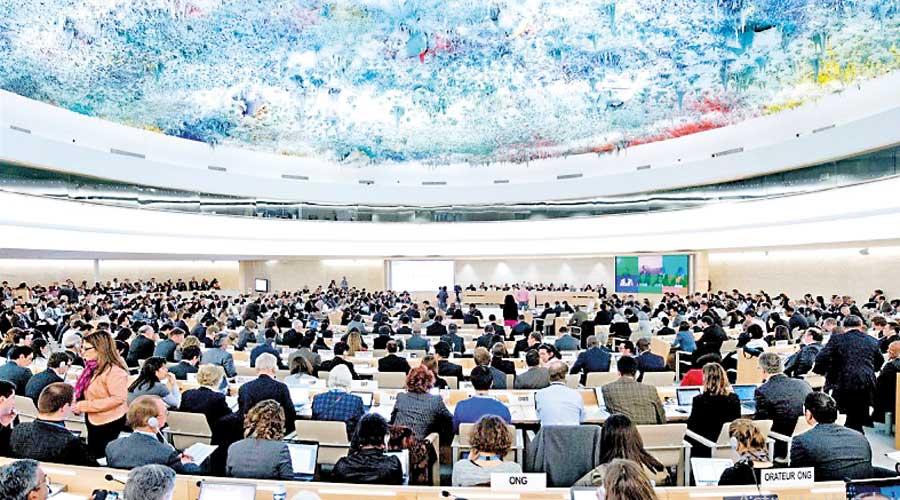11 Oct 2022 - {{hitsCtrl.values.hits}}
Stance on human rights appears to have been determined by the member’s geopolitical predilections and national interest

Looking at the voting on the UN Human Rights Council’s resolution on Sri Lanka on October 6, it appears that the decisions taken by the 47 members were determined by their respective positions in geopolitics and their national interest.
decisions taken by the 47 members were determined by their respective positions in geopolitics and their national interest.
The 20 members who voted for the resolution castigating Sri Lanka for alleged human rights violations, were Western nations and their political allies. Japan, which is a firm ally of the West, however, struck a different path. It abstained perhaps due to its national interest vis-à-vis Sri Lanka. Those who voted against the resolution had been at odds with the West geopolitically. And those who abstained either had mixed feelings about the West’s agendas or had other more important national interests at stake.
Among those who said “aye” were hardcore Western nations, such as the US, UK, France, Germany and the Netherlands. These were also votaries of the Western concept of human rights. Among others countries that said “aye” were those feeling threatened by the Russian invasion of Ukraine and had been flocking to the West and NATO. Many of these are new States that had emerged from the former Soviet Union but are now harbouring fears of Russian expansionism. Ukraine, which voted for the resolution, is being aided by the West to fight Russia.
Countries like Armenia, the Czech Republic, Lithuania and Finland, also fear that they might be Russia’s next target and have flocked to the US camp. Poland remembers that the USSR had occupied it ahead of World War II. Montenegro, which had emerged from the ruins of Yugoslavia, had joined NATO in 2017 and was firmly in the Western camp. Paraguay, Argentina and Honduras in South America, and South Korea in Asia, had been firm allies of the US.
However, it is remarkable that there was only one African country, Malawi and one Asian country, South Korea, among the 20 that went along with the US-led Western alliance in the Council.
"The 20 members who voted for the resolution castigating Sri Lanka for alleged human rights violations, were Western nations and their political allies"
The Nays
Among the seven countries that voted against the resolution, there were none from Europe. All of them had serious differences with the US. The nays were Bolivia, China, Cuba, Pakistan, Eritrea, Uganda and Venezuela. In 2008, Bolivia had expelled the US Ambassador. Even now the US has been pressing Bolivia to improve its rights record. US-Eritrea tensions were related to rights violations. In 2021, the US had imposed selective sanctions.
Uzbekistan is close to China as China is the largest trading partner. China has also been increasing its development loans to Uzbekistan as it regards Uzbekistan as a critical part of its Belt and Road Initiative. Uzbekistan’s voting against the resolution, with China, therefore, stood to reason. China’s hostility to the US needs no explanation. As for Pakistan, it has had a love-hate relationship with the US. It has also been a firm ally of Sri Lanka.
The US had broken off diplomatic relations with Venezuela in 2019, after accusing its authoritarian leader Maduro of electoral fraud. The Trump administration then tried to topple Maduro by sanctioning Venezuelan oil exports. Maduro responded by seeking economic and diplomatic help from Russia, as well as Iran and China.
Abstentions
Among the abstaining 20 countries, there was only one pro-US country, namely, Japan. Japan has always taken a soft line on Sri Lanka trying to reform it by helping it economically rather than sanctioning or shaming it publicly. The other countries in the group either had problems with the West, or had a tendency to take independent postures (ex: Malaysia or had geopolitical reasons to be neutral (ex: India). India had to be friendly both to the government of Sri Lanka and uphold the Tamil minority’s case for devolution of power. Therefore, abstention served the national interest well.
Under the Trump Presidency, US-Brazil relations were good, but not under President Biden. Trump supported the right-wing President Bolsonaro. But Bolsonaro is now being electorally challenged by the leftist Luiz “Lula” da Silva.
Cameroon’s relations with the US have been under strain over human rights abuses, in particular in the Anglophone Northwest and Southwest Regions of the country, and also over the pace of political and economic liberalization. In troubled Cote d’Ivoire, the US has been trying to help restore peace and support a democratic government whose legitimacy could be accepted by all the citizens of Cote d’Ivoire. In Gabon, China’s presence is manifest. In 2019 China was the buyer of 63% of the products sold by Gabon on the world market. 74.8% of the products sold during this reference year consisted of hydrocarbons.
Relations between the US and Gambia had not improved significantly due to the human rights and freedom of press shortcomings, which resulted in the suspension of Gambia’s compact with the Millennium Challenge Corporation (MCC) in June 2006. The US is involved in Mauritania on a wide array of issues, including human rights and the rule of law. In Namibia, there is a marked Chinese presence. There are scores of Chinese official development projects, through grants, concessional loans and preferential export buyers’ credit running to millions of RMB. Namibia is amenable to Chinese influence.
Given persistent troubles in Somalia, the US Embassy there was closed from 1991 to 2018. Senegal remained neutral at the UNHRC voting though its relations with the US had been good. US Secretary of State Blinken would be visiting the country in November.
The US has had problems with Sudan over terrorism. Although Sudan publicly supported the international coalition actions against the al-Qaida network and the Taliban in Afghanistan, it had criticized US air strikes in that country. In response to Sudan’s continued complicity in unabated violence in Darfur, President Bush had imposed economic sanctions on Sudan in May 2007. But in December 2020, Sudan’s designation as a State Sponsor of Terrorism was rescinded.
The UAE irked the US in December 2018, when it reopened its embassy in Syria, restoring ties with the government of anti-US, pro-Russian President Bashar al-Assad. In January 2019, the UAE hosted a Syrian trade delegation that was led by a businessman who had been on the U.S. Treasury sanctions list since 2011. As the UAE’s relations with China were intensifying, its alliance with the US began to face turbulence.
Additionally, China has been the biggest buyer of crude oil from the Gulf region. China has been broadening its economic and political footprint across the Middle East, which has created tension in UAE-US relations. In November 2021, the US warned the UAE about a Chinese military presence in it. US intelligence had found that China was secretly building a military facility at a port in Abu Dhabi. Following several American meetings and visits by US officials, the site construction was halted. Despite that, the US officials said that extensive Chinese presence in the UAE could endanger the planned US$ 23 billion deal of F-35 fighter jets, Reaper drones and other advanced munitions.
"Those who voted against the resolution had been at odds with the West geopolitically. And those who abstained either had mixed feelings about the West’s agendas or had other more important national interests at stake"
China’s Gains in Africa
The UNHRC voting shows Chinese gains in Africa and the relative weakness of the US in that continent. According to the National Bureau of Asian Research, “China appears to be seeking a loose, partial, and malleable hegemony over the global South, making the African continent a strategic priority for Beijing.” China has brought under the BRI umbrella, the Digital Silk Road, which is focused on improving information and communications technology and digital capabilities in Africa.
Most importantly, unlike the US and the West, China does not promote its authoritarian model of governance. It is, in fact, indifferent or blind to the type of regime that exists in a client State. Local regimes find this to be very convenient. Local nationalisms detest preaching by outsiders, especially former colonial powers or the new “imperialist” powers. These nationalistic feelings came to Sri Lanka’s aid at the time of voting in the UNHRC. Though the resolution was carried out, Sri Lankan nationalists drew comfort from the fact that the majority of the UNHRC members (27 out of 47) either said “nay” or abstained.
10 Jan 2025 1 hours ago
10 Jan 2025 1 hours ago
10 Jan 2025 3 hours ago
10 Jan 2025 3 hours ago
10 Jan 2025 3 hours ago